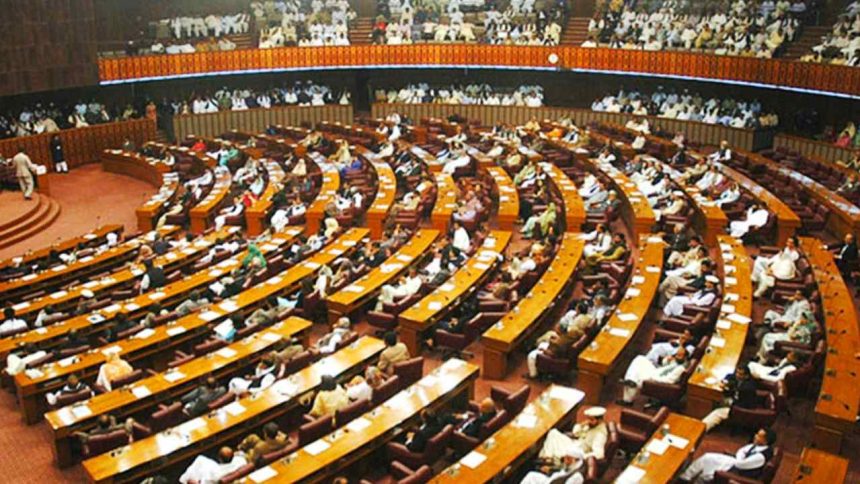Days after a top leader of a far-right political party announced a bounty on the head of Pakistan’s top judge, Law Minister Azam Nazeer Tarar made a strong statement in the Lower House, reaffirming the unanimous belief among lawmakers in the finality of the prophethood of Prophet Muhammad (peace be upon him).
His clear and firm words came in response to the urgent need to address and condemn extremist actions that threaten both the legal and moral fabric of society. He also took a strong stance against anyone issuing fatwas (edicts) against others and said that such actions were not only illegal but also against the teachings of Islam. “No one would be allowed to take law into their hands,” he said.
The minister’s remarks came in response to Sunni Ittihad Council Chairman Sahibzada Hamid Raza’s fiery speech in the National Assembly, in which the latter said the Supreme Court’s decision in Mubarak Ahmad Sani case was tantamount to rewriting the Constitution of Pakistan, and had affected the sentiments of millions of Muslims.
Responding to these concerns, Tarar insisted that any debate on the Supreme Court’s recent decision should take place in a proper parliamentary setting. He made it clear that actions declaring someone worthy of death violate both the Islamic law and the laws of Pakistan.
Reaffirming the importance of belief in the finality of the prophethood of Prophet Muhammad (PBUH), the minister said it was a cornerstone of the Islamic faith and even a slightest doubt in this belief would lead to one’s exclusion from Islam. He reminded everyone that Pakistan was created in the name of Islam, so every Muslim here was bound to uphold the dignity of the Prophet (PBUH) and protect the sanctity of Islam. He also called for unity among all parliamentarians on this important issue.
Addressing Hamid Raza’s concerns regarding the top court trying to rewrite the constitution, the minister said the Supreme Court could only interpret the constitution, not change it. “Only the state has the authority to review the court’s decisions or pass a resolution on such matters,” he said, adding that since these were legal issues, they should be handled by the Law and Justice Committee. He also urged the chair to refer the matter to the committee for a thorough review so that appropriate action could be taken.
Pakistan Muslim League-Nawaz (PMLN) lawmaker Hanif Abbasi backed the stance and said that respect and love for the Prophet (PBUH) were essential parts of the Islamic faith and did not need any scholarly endorsement.
He suggested setting up a parliamentary committee that includes prominent Islamic scholars to address the matter promptly.
Pakistan Tehreek-e-Insaf (PTI) leader Ali Muhammad Khan and Pakistan People’s Party (PPP) leader Abdul Qadir Patel recalled a historic decision made five decades ago under Zulfikar Ali Bhutto’s leadership. At that time, the National Assembly, with the support of leading Islamic scholars and political parties, had declared Qadianis and Ahmadis as non-Muslims.
Ali praised the House for passing a resolution that requires the term “Khatam un Nabiyeen” (seal of the prophets) to be included after the Prophet’s (PBUH) name in official documents and educational materials.
Proposing the formation of special parliamentary committee to investigate the issue, he argued that the recent decision by the Supreme Court had created confusion, which needed to be cleared up.
Jamiat Ulema-e-Islam-Fazl (JUI-F) lawmaker Abdul Ghafoor Haideri noted that while the Supreme Court’s role was to interpret the constitution, parliament was the only body that truly represented the people.
While issuing directives to refer the matter to the parliamentary committee for further examination, National Assembly Speaker Sardar Ayaz Sadiq called for an immediate meeting of the committee, and invited all members to join the discussions.
It may be mentioned here that two members of far-right political party, Tehreek-e-Labbaik Pakistan (TLP), were arrested and around 1,500 booked in various cities on Monday after the party’s deputy chief Zaheerul Hasan Shah announce a Rs 10 million bounty on the head of Chief Justice of Pakistan (CJP) Qazi Faez Isa.
The announcement invited a swift condemnation from the government as well as the Council of Islamic Ideology (CII), who declared that deeming anyone worthy of death was both un-Islamic and illegal.
Addressing a press conference, Defense Minister Khawaja Asif said issuing such statements in the name of a sacred religion was disrespectful to the religion itself. Calling the allegations levelled against the top judge nothing but a pack of lies, the minister promised action against those making such statements.
Meanwhile, the CII said in a statement that emotional actions leading to killings harmed the belief in the finality of prophethood. It said that no individual, group or mob had the authority to act as a judge and issue an edict for someone’s murder. “Such actions contradict the teachings of the Quran and Sunnah,” it said.












